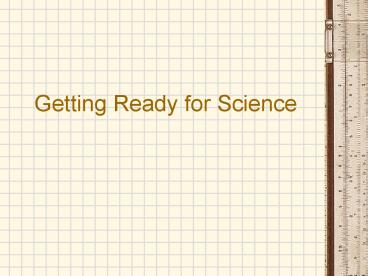Getting Ready for Science - PowerPoint PPT Presentation
1 / 17
Title:
Getting Ready for Science
Description:
Different tools are needed to complete different jobs. ... and display data, use numbers, compare, classify, interpret data, infer, and predict. ... – PowerPoint PPT presentation
Number of Views:22
Avg rating:3.0/5.0
Title: Getting Ready for Science
1
Getting Ready for Science
2
Using Science Inquiry Tools
- Different tools are needed to complete different
jobs. - Scientists use tools to measure and observe
things in nature. - Tools that can be used to measure objects
include thermometer, tape measure, ruler,
measuring cup, spring scale, and dropper.
3
Microscopes
- A tool that makes small objects appear larger.
- Allows you to see details.
- The main parts of a microscope include the
eyepiece, stage, base, lenses, and adjusting
knobs.
4
Measuring Temperature
- A thermometer is used for measuring temperature
on Earth. - The liquid in the thermometer takes up more space
in hotter temperatures.
5
Balance or Spring Scale?
- A balance is a tool that measures the amount of
matter in an object its mass. Items are measured
by balancing the item against weights or another
object. - You can use a spring scale to measure an objects
weight.
6
Safety in the Lab
- Be sure watch safety icons.
- Obey the teachers directions.
- Be careful with sharp objects.
- Be careful with electricity.
- Wear safety goggles.
- Pull your hair back.
- Dont eat or drink anything.
- Wear mitts to handle hot objects.
7
What is inquiry?
- An investigation is a procedure carried out to
gather data. - Inquiry is an organized way to gather information
and answer questions. - Inquiry skills include observe, measure, gather,
record, and display data, use numbers, compare,
classify, interpret data, infer, and predict.
8
Using Inquiry Skills
- To answer a question you might plan and conduct a
simple investigation. - An experiment is a procedure you carry out under
controlled conditions to test a hypothesis. - Within your experiment you have control variables
which are factors that can affect the outcome of
the experiment.
9
Models, Time, and Space
- When conducting an experiment you make a model or
a physical representation of your object. - Use Time/Space relationships you need to think
about the ways in which moving and nonmoving
things will relate to each other. You also have
to figure in which order things will happen.
10
The Scientific Method
- Step 1 Observe and ask a question.
- Step 2 Form a hypothesis.
- Step 3 Plan an experiment.
- Step 4 Conduct an experiment.
- Step 5 Draw conclusions and communicate results.
11
Observe and Ask Questions
- Use your senses to make observations.
- Record 1 question you would like to answer.
- Do research to find out more information.
12
Form a Hypothesis
- Write a possible answer to your question.
- Write down your possible answer in a complete
sentence.
13
Plan an Experiment
- Decide how to conduct a fair test.
- Write down your steps or procedures.
- List the materials you will need.
14
Conduct an Experiment
- Follow your procedures.
- Observe and measure carefully.
- Organize your data so that it is easy to
understand.
15
Draw Conclusions Communicate Results
- Make charts, tables, or graphs to display your
data. - Write a conclusion.
- Tell whether your hypothesis was supported or not.
16
Variables
- Within any experiment you have variables.
- A variable is a factor, such as size or speed,
that can have more than one condition size can
be small or large and speed can be fast or slow. - You would not test the size and speed of a car at
the same time. - The variables are those things that can affect
the outcome of your experiment.
17
Questions
- How are science tools used?
- How are mass and weight measured?
- How do inquiry skills organize the way in which
people gather data? - What is the difference between an investigation
and an experiment? - What are the steps of the scientific method?
- How do scientists use the scientific method?








![get [PDF] Download Foundations of Library and Information Science PowerPoint PPT Presentation](https://s3.amazonaws.com/images.powershow.com/10051529.th0.jpg?_=20240610012)






















